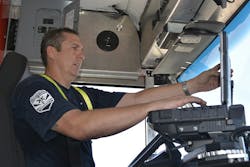I joined the First Responder Network Authority (FirstNet) almost one year ago. Before that, I spent my 29-year career working to improve communications and data access. Getting access to data, interoperability, capacity and customer service are still issues that public safety wrestles with today. Most access to data is limited to computer-aided dispatch (CAD) systems. Broadband technology is being used by more responders today, but it is still limited in availability and is often cost prohibitive.
As FirstNet progresses toward the deployment of the nationwide public safety broadband Network (“Network”), here are what I believe to be the top reasons why the Network is not only needed by the fire service, but how it is going to revolutionize the way they respond to incidents and emergencies:
Coverage
When I entered my career with the fire service, our fire department had its own proprietary data system. The coverage was acceptable for use on the street, but did not support handheld or in-building use. The ability to provide data coverage for an expanding service area was cost prohibitive. Moving to commercial broadband service providers was a difficult but necessary decision. We initially used several service providers to diversify our fleet in the event of a service outage. The coverage gaps of individual carriers made it necessary to use different providers to get the geographic coverage needed to respond in the large service area. The use of commercial systems and the coverage provided was a great improvement over the department-owned system. Coverage today is much better, but when incidents occur in remote areas, data access is often unavailable.
Capacity
We don’t have to look back very far to see that access to data by public safety is not a certainty. Capacity limitations and competition with other users are obstacles in maintaining persistent data connections for public safety. In today’s commercial systems, public safety does not have priority and preemption. This was very evident during the Boston Bombing in 2013, when commercial carriers in the region urged their customers to use text or email to free up capacity for public safety officials responding to the scene. During Hurricane Sandy, where the infrastructure was damaged, a similar situation occurred where both members of the public and public safety users were trying to access the limited resources of the commercial network, creating system congestion.
Service
One lesson learned early on was that even though we are public safety, we are still just another customer to the commercial data providers. On many occasions we endured outages due to “upgrades” and “maintenance” without getting a warning. The outages were scheduled events in the middle of the night during their low call volume times. As you all know, public safety responders work 24/7/365, so those “low volume times” had a big impact on public safety operations. Public safety staffing levels are based on the efficiencies gained by the use of technology, so when a disruption happens, public safety is immediately understaffed and can only sustain a short outage. Today, public safety is unfortunately still just another customer and is often communicating on the same customer service lines as other businesses. FirstNet is focused on the needs of public safety and understands that data access is critical to responders. FirstNet is dedicated to providing public safety-grade customer service. Public safety users will have priority as customers and as users on the Network.
Access to technology
While some of the technologies envisioned by FirstNet are available today, most of them that are used by public safety to be public-safety-grade durable are custom-designed, and the use of globally standardized technologies is an instrument being used to keep costs low. Many handheld radios being used today cost upwards of $7,000 per device. By using global standards—rather than creating a special standard for public safety—FirstNet can take advantage of economies of scale provided by the global market. This strategy will provide access to technology where costs have been a limiting factor, especially for rural and volunteer departments.
The 9/11 terrorist attacks changed our nation and highlighted the need for better coordination, communications, and information sharing at all levels of government. Subsequent events such as hurricanes Katrina and Sandy, the Boston Bombing, the Yarnell 19 and the Virginia earthquake all serve as reminders of the communications and data problems that still persist for public safety users.
But FirstNet is not just for the large incidents and events; it will provide a highly reliable Network for day-to-day use to increase the safety and efficiency of responders and elevate the services delivered to communities in all 50 states, the five territories, the District of Columbia, and tribal nations.
FirstNet plans to deliver the Network that public safety needs and has been waiting on for more than 15 years. The Network will provide users with:
- Dedicated spectrum;
- Priority and preemption;
- Public safety-grade services;
- Cybersecurity; and
- Public safety applications.
At the end of the day, the delivery of the Network is our goal. To steal a phrase from Gene Krantz, NASA Flight Director for Apollo 13, “Failure is not an option.”
About the Author

Mike Worrell
Mike Worrell is the FirstNet Senior Fire Services Advisor. He was previously with the Phoenix Fire Department where he served for 29 years, most recently as the technical services division chief. Worrell was also a member of the Public Safety Advisory Committee (PSAC) to FirstNet, a member of the National Urban Search and Rescue Incident Support Team, and a qualified Communications Unit Leader and Communications Technician instructor. Prior to joining the Phoenix Fire Department, he was an electronics technician in the U.S. Navy, Submarine Service.
